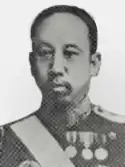Han Kyu-seol
Han Kyu-seol (Hangul:한규설, Hanja:韓圭卨 29 February 1848 – 22 September 1930) was a prime minister of Korean Empire when Japan–Korea Treaty of 1905 was signed. Han opposed the treaty, but he failed to prevent it from being signed.
Han Kyu-seol | |
|---|---|
| 한규설 | |
 | |
| Prime Minister of Korean Empire | |
| In office 27 August 1905 – 17 November 1905 | |
| Monarch | Gojong |
| Preceded by | Cho Byeong-ho |
| Succeeded by | Min Young-cheol |
| Personal details | |
| Born | 29 February 1848 Seoul, Joseon |
| Died | 22 September 1930 (aged 82) Cheongju, Korea under Japanese rule |
| Military service | |
| Years of service | 1905–1907 |
| Rank | Lieutenant General |
Life
Han was born on 29 February 1848 in Seoul. In his young age, Han passed the Gwageo's military examination.[1] In 1884, Han became the commander of army of the in Gyeongsang-right province.[2]
During the Gapsin Coup, his younger brother, Han Kyu-jin was killed. Gojong of Korea was pathetic about him so that Gojong appointed Han one of the Commissioner Generals of the police. With Yu Kil-chun, Han traveled United States. After the proclaim of Korean Empire, Han was appointed in many important jobs. On 15 February 1902, Han was appointed as Minister of Law.[3] On 27 August 1905, Han was appointed as the prime minister,[4][5] then Lieutenant General of the army on 8 November 1905.[6] As a prime minister, Han opposed the Eulsa Treaty. However, Han failed to prevent the treaty from being signed.[1] After the treaty of 1905 was signed, Han, as well as Five Eulsa Traitors, got a lot of criticism from the people.[7] After the treaty, Han was removed from office on 17 November 1905 for doing an inappropriate thing inside the palace.[8] Choe Ik-hyeon wrote that Han also has a great fault for the treaty, which is not caring his ministers and letting them to agree.[9] Han wrote memorial about this incident. Han wrote that at the first time, all of the ministers were against signing the treaty. However, when Han was locked in Jungmyeongjeon, ministers started to agree. After the signing, he tried to invalidate the treaty by dismissal to the five ministers but, Han was who got dismissal.[10] On 30 November 1905, his dismissal was canceled.[11] After, he still was an official of Korea. He was one of the member of national assembly and special official in Gungnaebu.[4] On 18 December 1906, Han was appointed as the speaker of Junchuwon.[12] In 1907, he was removed from the army because he did not have any placement.[13]
After the annexation of Korea, Japanese Government gave Han title of Baron but Han refused.[14] In 1920, Han established Joseon education organization with some others. He died on 22 September 1930 in Cheongju City.[1]
References
- "한규설(韓圭卨) - 한국민족문화대백과사전". encykorea.aks.ac.kr. Retrieved 2022-03-21.
- "조선왕조실록". sillok.history.go.kr. Retrieved 2022-03-21.
- "한국고전종합DB". db.itkc.or.kr. Retrieved 2022-03-21.
- "한국사데이터베이스". db.history.go.kr. Retrieved 2022-03-21.
- "한국고전종합DB". db.itkc.or.kr. Retrieved 2022-04-18.
- "조선왕조실록". sillok.history.go.kr. Retrieved 2022-03-21.
- "[나는 역사다] 투사도 부역자도 아니었던 구한말 관료". www.hani.co.kr (in Korean). 2017-11-16. Retrieved 2022-03-21.
- "한국고전종합DB". db.itkc.or.kr. Retrieved 2022-04-18.
- "한국고전종합DB". db.itkc.or.kr. Retrieved 2022-03-21.
- "을사늑약 반대한 한규설 '회고담' 100년만에 발굴". 경향신문 (in Korean). 2005-11-14. Retrieved 2022-03-21.
- "한국고전종합DB". db.itkc.or.kr. Retrieved 2022-03-21.
- "한국고전종합DB". db.itkc.or.kr. Retrieved 2022-04-18.
- "한국고전종합DB". db.itkc.or.kr. Retrieved 2022-03-21.
- "116년 전 오늘, 비운의 '을사늑약' 현장 직접 가보니". 오마이뉴스 (in Korean). 2021-11-17. Retrieved 2022-03-21.
- "서울특별시 민속문화재 장교동한규설가옥 (長橋洞 韓圭卨 家屋) : 국가문화유산포털 - 문화재청". Heritage Portal : CULTURAL HERITAGE ADMINISTRATION (in Korean). Retrieved 2022-03-28.